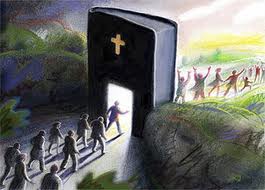Choosing the Narrow Gate
We are destined for the eternal love of God. But we can
only come to this love in our human life, in the time that belongs to us and
others, in the world here and now.
Vis-a-vis the world
that is created to serve him, and vis-a-vis God who created him, man is free.
He is free to accept or reject his vocation to live as a human being and his
vocation to live as a child of God, but whether he accepts or rejects them depends
on his choice.
On the other hand, man
does not have the capacity to create. He cannot recreate man: he cannot invent
some other child of God. He nevertheless retains the capacity in freedom to
live what he was given in a way that degrades, destroys, or falsifies it.
The only thing that
counts between us and God is what is free. God judges us according to our
choices. Faith is given to that in man that has remained free. It is the
science of eternal realities, of all that God has told us about himself and all
that he has told us about ourselves.
It is the art of
knowing how to do God's will, the science of charity. It governs our choices.
It was given to us so
that we might attain eternal life, but that we might do so in time; it was
given to us so that we might live God's life, but that we might do so in our
human life; so that we might bring about the salvation brought by Christ, but
to bring it about in the world and in history.
It is given to us so
that we would choose God with human acts; so that we would do God's will in
human history, in the human world, with human acts. It is as temporal as we
are; it will pass away when we die.
Faith is given to the
human being we are on behalf of all the human beings that we are not.
Moreover, faith
teaches us that the Christian life should be structured like a living tissue,
according to eternal laws, but that it must be lived in the immediate, in the
moment, in the particular: We are destined for the eternal love of God. But we
can only come to this love in our human life, in the time that belongs to us
and others, in the world here and now.
[1] Madeleine Delbrel (d. 1964) was a
French laywoman, writer, and mystic devoted to caring for the poor and to
evangelising culture.
